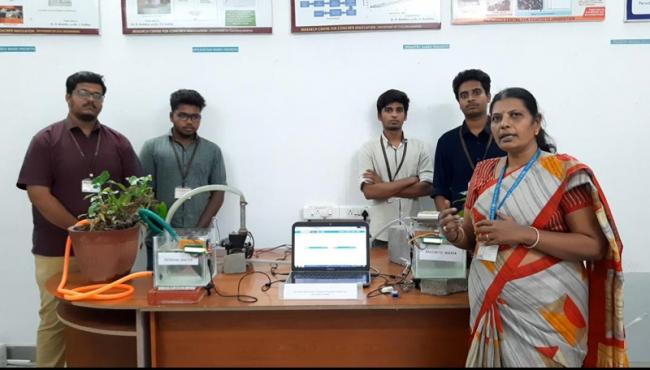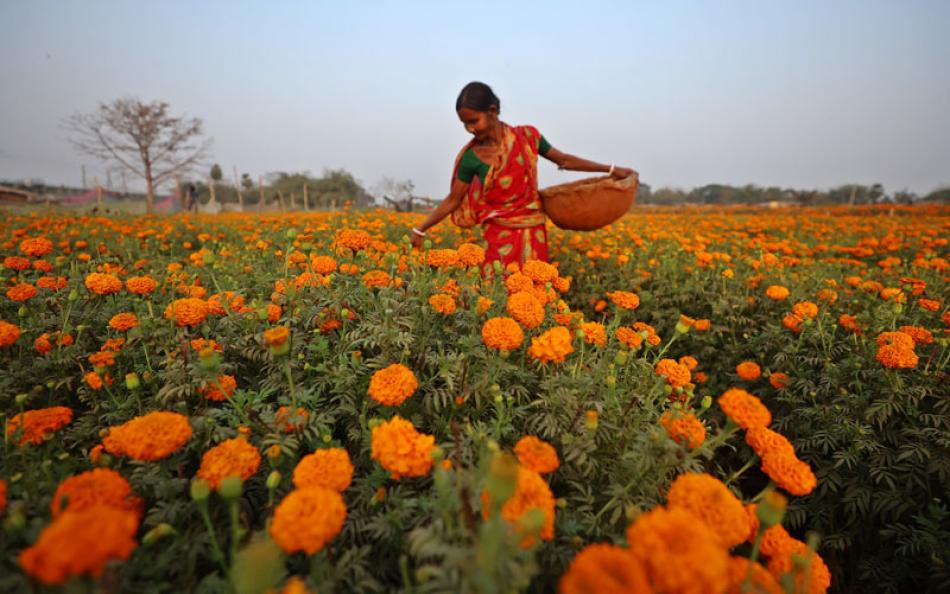NITN | @notintownlive | 16 Oct 2020, 04:39 am

Salem: Recognizing the importance of water in agriculture, a group of students has developed farm-friendly system that reduces water usage and minimizes dependency on fertilizer.
The team from Sona College of Technology, Salem, has secured first place in the Smart India Hackathon 2020, in the Hardware category, for their solution that uses the principles of Internet of Things (IoT) and magnetisation.
Of the 343 problem statements released for all participants, across 40 nodal centres, solutions from four teams from across India were recognised in the finals.
The team consisted of six students – Manimoliselvan C: Dinesh Kumar B, Manikandan S, Lokeshwar S, all pursuing final year Civil Engineering and Kungumaswetha A, final year, Computer Science Engineering and Suvetha S, final year (Electronics and Communications Engineering).
Dr R Malathy, Dean (R&D) and Professor, Department of Civil Engineering, Sona College of Technology, who mentored the team shared, “Our project aims to help farmers by purifying their available borewell water significantly, with zero waste.”
While borewell water is used for almost all farm applications, the nature of such water causes scaling. This in turn leads to non-uniform water supply to plants and poor mineral absorption. The limescale deposition also damages soil structure. Such hard water is absorbed by the plant cells with difficulty.
If through intervention, the water’s minerals are broken down into smaller particles, they become more bio-available to these plant cells.
Sona College’s solution achieves this by using a designated permanent rare earth magnet. The water is passed through a magnetic field and undergoes electrolysis and magnetisation. This breaks the larger water clusters into smaller, hexagonal-shaped clusters. Such magnetically treated, hexagonal-structured water molecules not only stop scaling, but also remove existing scaling.
The magnetic structuring breaks all minerals into smaller particles, and in the process, the salt in the soil is also broken down. As a result, the salt sinks deep into the soil and can be washed away easily. The desalinisation happens quickly over a season, creating much healthier plants and greater yields, and a better final product.
For even better effectiveness and easy monitoring, the inlet and outlet of the water pumping system developed by Sona College has been fitted with sensors that can measure water levels, weather and optical transducers to monitor nutrient absorption.
As per tests run by the team, the overall results in terms of plant growth proved to be dramatic. With minimal usage of water, the plants were hydrated well, were able to absorb maximum minerals. This resulted in greater yields, larger and better end product, earlier maturation, longer shelf life, and healthier plants.
Such a system allows a reduction in the water needs, as well as dependency on fertilizer and pesticides and can be a boon for farmers.
“This helps carry sufficient minerals in the standard composure, with water free from hardness for their transpiration and respiration, with zero maintenance cost. The IoT-enabled, user-friendly system makes our project unique,” said Dr Malathy.
“This solution was developed in around six months, starting with selection of the right magnet that can be used for borewell water at all places, visual observation on potted plants and then moving to a peanut field for research,” added Dr Malathy.
She shared that the team is also working on applying for a patent for their IoT-based solution.
- Ind.AI: Sovereignty, jobs, energy and the “What If?”
- Diabetes, muscle loss and the illusion of quick fixes: Why lifestyle correction—not shortcuts—remains our strongest medicine
- Kolkata: Rotary honours Padmashri 2026 awardee Pandit Tarun Bhattacharya
- Kolkata: Rotary Club of Calcutta Pointers, Indian Cancer Society host cancer awareness, screening camp
- ‘This Union budget is about building capacity, not chasing short-term consumption’
- AI will replace surgeons, coders — and billions of jobs, warns Sraddhalu Ranade at MCHD-SKC Memorial Lecture
- Religion without servility: Journalist Anshul Chaturvedi on why Vivekananda speaks to believers and atheists alike
- Culturist Sundeep Bhutoria unveils anthology When Gods Don't Matter at Jaipur LitFest 2026
- Kolkata CP urges elderly to stay alert against digital scams at ‘Pronam’ interaction
- Sona Incubations, Salem picks 17 startups for Rs 11 Mn DST investment, grant
Air India and Air India Express will present their upgraded cabin products and refreshed on board experiences at SATTE 2026, taking place from 25 February to 27 February 2026 at Yashobhoomi, New Delhi, offering trade partners and visitors a first-hand look at the airlines’ transformation journey.
Montreal: Air Canada and Pegasus Airlines on Thursday announced a new interline partnership aimed at expanding travel options between Canada and Türkiye.
Montreal: Air Canada will expand its Mexico network this summer, increasing seat capacity by 18% compared with last year and launching a new year-round route between Montréal and Guadalajara.





